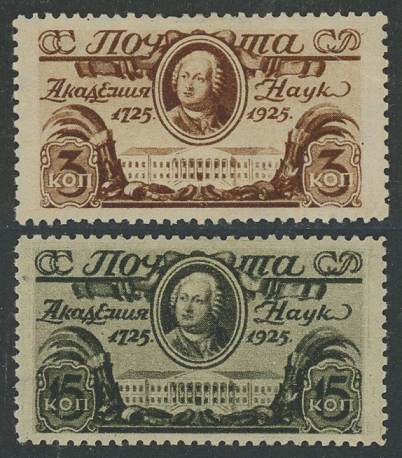Philately offers a unique perspective on history, capturing key events and milestones in miniature works of art. One such remarkable Soviet stamp issue is the 1925 Bicentenary of the Academy of Sciences series, commemorating the 200th anniversary of the Russian Academy of Sciences, founded by Peter the Great in 1725.
These stamps honour Mikhail Lomonosov, Russia’s most celebrated scientist, and the Academy of Sciences in Leningrad (now St. Petersburg), highlighting the Soviet Union’s emphasis on scientific progress and education.
Historical Context: The Russian Academy of Sciences
The Russian Academy of Sciences was founded in 1725 under the orders of Peter the Great, marking the beginning of organized scientific research in Russia. Over the centuries, it became the centre of scientific advancements in chemistry, physics, astronomy, and humanities.
To commemorate its bicentennial in 1925, the Soviet postal service issued two stamps, celebrating both the institution and one of its most famous members, Mikhail Lomonosov.
Who Was Mikhail Lomonosov?
Lomonosov (1711–1765) was a polymath, scientist, and writer who made major contributions to physics, chemistry, geology, and linguistics. He played a crucial role in the development of the Russian scientific community and helped establish Moscow State University.
His legacy was so significant that he was chosen as the central figure for this stamp issue, reinforcing the USSR’s focus on science, education, and national pride.
The 1925 Soviet Academy of Sciences Stamps: Design and Features
Designed by N. Alekseev, this series consists of two denominations, each featuring a portrait of Mikhail Lomonosov alongside the building of the Academy of Sciences in Leningrad.
- The 3 kopeks chestnut stamp showcases Lomonosov’s portrait framed by architectural elements of the Academy of Sciences. The inscription “Академия Наук 1725–1925” (Academy of Sciences 1725–1925) marks the bicentenary.
- The 15 kopeks deep olive-green stamp follows a similar design, emphasizing the importance of scientific institutions in Soviet society.
Printing and Perforation Details
These stamps were printed using recess printing, ensuring high-quality engravings. Several perforation types exist:
- Perforation 13½ was the standard issue.
- Other varieties include 12½, 12½x12, and 12½x13½, making them highly collectible.
Rare Varieties and Errors
As with many early Soviet stamps, the 1925 Academy of Sciences issue features rare printing varieties and errors that significantly increase their value.
- Imperforate Between Pairs – Some sheets were misprinted, resulting in pairs where stamps were imperforate between them, making them extremely rare and valuable.
- Different Perforation Types – Several perforation varieties exist, with some rarer than others.
- Proofs on Thick Unwatermarked Paper – A limited number of proofs were printed on thick unwatermarked paper, making them highly sought after by collectors.
Market Value and Collector Demand
Due to their historical significance and unique print varieties, these stamps remain highly desirable among Soviet stamp collectors.
- The 3k chestnut stamp typically sells for £26 mint and £15 used.
- The 3k imperforate between pair is extremely rare, valued at £1,300.
- The 3k with perforation 12½ is worth £4.50 mint and £6.25 used.
- The 3k with perforation 12½x12 is more valuable, at £16 mint and £10 used.
- The 3k with perforation 12½x13½ is rare, valued at £950 mint and £650 used.
- The 15k deep olive-green stamp is valued at £9.50 mint and £7.50 used.
- The 15k perforation 12½ is worth £6.25 mint and £8.75 used.
- The 15k perforation 12½x13½x12½x12½ is the rarest variety, valued at £1,600.
Prices for proofs on thick unwatermarked paper vary widely based on availability, making them extremely rare collectibles.
The Legacy of the 1925 Academy of Sciences Stamps
These stamps stand as a monument to Russia’s rich scientific heritage, showcasing the Soviet Union’s respect for knowledge and education. While later Soviet policies shifted toward ideological control over science, the 1925 Academy of Sciences issue remains a tribute to intellectual progress.
For collectors of Soviet history, scientific memorabilia, and rare philatelic issues, this stamp set is a must-have, preserving a pivotal moment in Russian science and culture.


